Dmitry Ivanovich Donskoy (on the 665 anniversary of the birth)
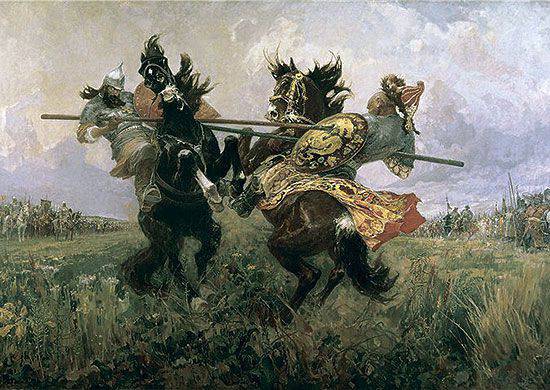
Dmitry Ivanovich Donskoy - the Grand Duke of Moscow (from 1359), Vladimir (from 1362) and Novgorod (from 1386), an outstanding statesman, a famous commander. His name is connected with the strengthening of the leading role of Moscow in the unification of the Russian lands and their joint defense against foreign conquerors, including the victory in the Battle of Kulikovo (1380).
12 October 1350 in Moscow in the family of the second son of Ivan Kalita, the son of Prince Zvenigorod Ivan Ivanovich Krasny and his second wife Princess Alexandra Ivanovna, was born a son. At baptism, he was given the name Dmitry in honor of St. Dmitry of Solun.
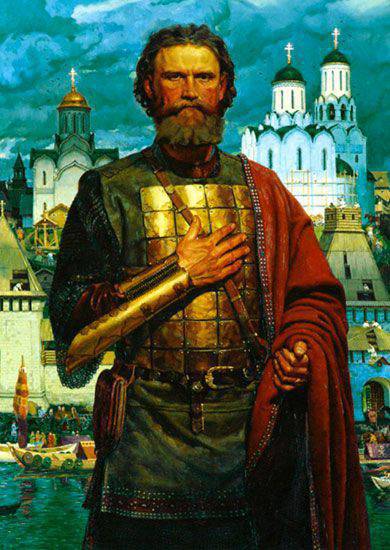
Very little is known about the childhood of the future grand duke. The “Word on the Life of the Grand Duke Dimitriy Ivanovich” states: “He was brought up in piety and glory, with edifying instructions, and from infantile years he loved God. He was still young for years, but he devoted himself to spiritual matters, he did not lead idle conversations, he did not like obscene words and avoided malicious people, but he always talked to virtuous people. ” Father all his free time was next to his son and taught him.
After the death of the plague in 1353, the elder brother Simeon Proud, Dmitri Ivanovich's father became the Grand Duke, after which in 1355 he made the traditional trip for the Russian princes to the Golden Horde, taking with him rich gifts to the great khan, his family and grandees. In Sarai, he received a label for a great reign and became the first senior ruler in Russia. So the fate of Prince Dmitry made a sharp turn: from the heir to a small Zvenigorod inheritance, he became the heir to the Moscow grand-prince's power.
The Grand Duke Ivan Ivanovich Krasny, did not rule long. He died of the plague 13 November 1359, at the age of 33 years. His eldest son, nine-year-old Dmitry, ascended the throne of Moscow. Metropolitan of Kiev and All Russia Alexy became the mentor of the young prince and ruler of the Moscow principality at that time. He was a man of enormous intelligence, great tact, and a broad political outlook. He had support among the majority of Orthodox people who lived in the Moscow principality, which at that time was of decisive importance. Moreover, as the supreme head of the Russian church, Alexy had quite real power over all Russian princes without exception. He skillfully used his authority to put into practice the idea of the primacy of Moscow in North-Eastern Russia. Having matured, Dmitry more than once consulted with him, continuing the policy of his father and grandfather in collecting Russian lands around Moscow.
In 1360, Metropolitan Alexy sends the young Dmitry at the head of the Moscow delegation to Sarai for the Khan label for a great reign. The trip was fraught with great danger, but it was also extremely important from a political point of view. The future great prince from a young age studied the basics of diplomacy and the wisdom of a ruler. The trip was unsuccessful - the Grand Duke Vladimir throne, the little Prince Dmitry of Moscow lost, because in the Horde there was no practice to issue labels to the great reign of vassals for children, and the label went to the Suzdal-Nizhny Novgorod principality to Prince Dmitry Konstantinovich. Moscow lost power over a large territory of grand-ducal lands with a significant population. It seemed that the future does not promise to the young prince Dmitry of Moscow especially bright hopes that the dream of the Moscow championship in Russia is over ...
In the Golden Horde at that time there was a bloody Khan civil strife, as a result of which several dozen khans changed in a few years. Russian chroniclers very accurately called what was happening "the great, more noticeable." "Mouthful" took advantage of Metropolitan Alexy. Using the interest of the next Golden Horde Khan in Russian silver, in 1361, he sends a matured Dmitry to the Saray. Gifts had their effect, and in 1362, Khan Murat gave the 12-year-old Moscow special prince the desired label for a great reign.
Inspired by this success, the Moscow boyars, putting the young heirs of the Moscow throne, Dmitry, his brother Ivan and cousin Vladimir Andreevich Serpukhovsky, onto horses, “went to war” against Suzdal. After a long confrontation between the troops of the two principalities, Dmitriy Konstantinovich gave up Suzdal, and Dmitriy Ivanovich got the right to be considered solely the Grand Duke In 1363, Dmitry "took his will" over Prince Konstantin of Rostov.
Subsequently, the military-political union of the two Dmitriyev was sealed by the marriage of the Moscow Prince Dmitry with the daughter of Dmitry Konstantinovich Evdokia. Evdokia’s father refused the label on Vladimir in favor of Moscow. Soon the Nizhny Novgorod lands connected with Suzdal were ceded to Moscow. The wedding took place on 18 on January 1366 of the year. We played it in Kolomna, because Moscow is completely burned out by the next fire. Even the oak Kremlin of Ivan Kalita could not resist, whose walls were plastered with clay and whitewashed with lime.
Soon the Moscow army headed by Dmitry Ivanovich spoke to Nizhny Novgorod. The younger brother of the Suzdal-Nizhny Novgorod prince Boris decided to win the right to reign from his older brother Dmitry Konstantinovich, but the Moscow troops arrived in time, and everything ended in peace.
However, not only the wedding and the struggle for the rights of the father-in-law was engaged at that time the young prince Dmitry Ivanovich. He started a grand construction in Moscow. “In the winter of 1367, the prince great Dmitry Ivanovich,” reports the Rogozhskaya Chronicle, “he told his brother Volodymyr Andreevich and all the boyars the oldest, and decided to put the city of stone to Moscow. Yes that I conceived, I did it. ” Limestone stones for the construction of the Kremlin were taken on a sleigh along the bed of the frozen Moscow river, and in the spring they were rafted from Myachkov quarries, which were located not far from Moscow. The gates of the new Kremlin were hospitably opened for the khan ambassadors (Dmitry preferred to buy off rich gifts from them), but for other neighbors and rival princes the Kremlin became a powerful defensive fortress.
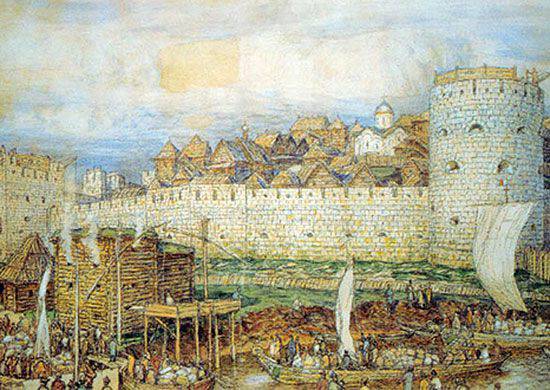
In addition to defensive measures (the construction of the Kremlin), Dmitry Ivanovich, together with the metropolitan, tried to crush the Tver ruler. Alexy summoned Mikhail Tversky in 1368 to Moscow, allegedly for an arbitration court with his cousin. Despite the guarantees of immunity, given by the metropolitan and Grand Duke Dmitry, the Prince of Tver and his boyars were captured and divorced in the boyars' courts into imprisonment. Only the intervention of the Horde ambassadors, who were then in Moscow, returned Mikhail freedom.
The embittered prince, returning to Tver, began to vigorously prepare for war with Dmitry Ivanovich. Without waiting for Mikhail to gather strength, Dmitry of Moscow moved the regiments to the enemy, and he fled to Lithuania, to Grand Duke Olgerd, who was married to his sister. Eighteen-year-old Dmitry did not yet have sufficient military experience and did not take the necessary measures on the western frontiers. Olgerd, however, promptly went on the march. It was too late to learn about the invasion of Lithuanian troops in Moscow. Hastily assembled a Moscow watchdog regiment under the leadership of Governor Dmitry Minin and Akinf Shuba was completely destroyed by the superior forces of the Lithuanian cavalry on the Trosna River 21 on November 1368 of the year. Olgerd headed straight for Moscow. Dmitry Ivanovich took refuge in his capital city and prepared for a siege. During 3 days, Olgerd’s troops besieged a new stone fortress, but could not take it. Having seized booty and prisoners, he went to Lithuania. For the first time in 40 years, the Moscow principality was devastated in such a way that the Moscow chroniclers compared the Olgerd invasion with the Batu campaign. According to the results of "Lithuanian", Dmitry Ivanovich had to return the land of the Klin principality to Mikhail of Tver.
In the next few years, while the war between Moscow and Tver (1368 – 1375) lasted, Olgerd tried to attack Moscow twice more, but each time his march ended in failure. In the struggle for seniority among the Russian princes, Dmitri won. The success of the young Moscow ruler was explained by the wise support of Metropolitan Alexy, who helped his pupil in uniting the principalities and joining Uglich, Galich, Beloozer, and Kostroma, Dmitrov, Chukhlom, Starodubsky principalities to Moscow. In early December, Prince Dmitry Ivanovich 1374 assembled Russian princes and boyars in Pereslavl-Zalessky, where they discussed ways to rid the country of Horde dependence. In 1375, Dmitry defeated the Olgerd Lithuanian army near Lubutsk. The Horde’s help to the Lithuanian prince did not come on time, and Mikhail of Tver, “seeing his exhaustion, the whole Russian land rose up for him,” he asked Dmitry of the world with his son-in-law Olgerrd. By the 1375 agreement of the year between Tver and Moscow, the Prince of Tver is relegated to the position of the “younger brother” of the Grand Duke of Moscow and forever renounces claims to great reigning and agrees to an alliance with Dmitry against the Golden Horde. This is the first in stories a written indication of the intention of Moscow to create an alliance of Russian principalities to protect against Horde and Lithuanians.
The military alliance of the Russian princes was becoming a real power, and Sarai understood this. Horse detachments of Golden Horde attacked the lands of the Nizhny Novgorod principality and looted them. Then the Moscow regiments and the Nizhny Novgorod army in the 1377 year undertook a retaliatory campaign against the Horde city of Bulgar. The battle took place, but the matter was not reached before the storming of the city. Its inhabitants sent petitioners, with the purpose of buying off. Russian troops with rich booty returned home. In addition, the Russians planted their tax collectors and customs officials in Kazan to monitor the correctness of the trade exchange between local and foreign merchants with the Russian side.
The victorious march of the Russian warriors against Bulgar evoked quite understandable displeasure at the rate of the actual ruler of the Horde Mamai. At that time, a certain prince Aripsha (Arab Shah) just ran out from behind the Volga to the mighty temnyk (the “commander of the ten thousandth army”), and with a large cavalry army he moved to Nizhny Novgorod. The Moscow prince came to the aid of his father-in-law Dmitry Konstantinovich Nizhegorodsky. However, there was no news of the enemy, and Dmitry returned to Moscow, leaving the troops in charge of the governor. But the patrols in the camp were not exhibited. Weapon was in the carts. 2 August 1377, the Golden Horde, carried out on secret forest paths on the orders of the Mordovian princes, suddenly fell upon the Russian camp and defeated it. During the flight, many people drowned in the river or were captured. The Tatar cavalry pursued the fleeing troops and three days later rushed into Nizhny Novgorod, devastated him and burned him. The prince of Nizhny Novgorod was not in the city at that time - he was in Suzdal, this saved him from destruction. Having devastated the neighboring volosts, the Golden Horde went to the steppe. Now the campaign of a large, united Horde army against Moscow Rus became a reality. It was only a matter of time.
In February, 1378, died Metropolitan of All Russia Alexy. Dmitri lived for twenty-eight years under his spiritual supervision, and he could not blame his Metropolitan for anything. Over the years, Dmitry Ivanovich turned into a talented politician and military leader, surrounded by experienced voivods. Among the comrades of the Grand Duke, Vladimir Andreyevich Serpukhovskaya and Dmitry Mikhailovich Bobrok-Volynsky were distinguished by their leadership skills. Later they were joined by the Olgerdovich brothers - Andrei Polotsky and Dmitry Bryansky. Moscow began to attract a lot of brave and energetic people, including from other principalities, etc. The permanent composition of the Russian army increased - up to 20 thousands of warriors, harmonious infantry regiments appeared, consisting of urban and rural militias. The organization of the troops improved significantly: a single command was created, a common gathering was held more often. In the years preceding the Kulikov battle, the training of Russian warriors increased. The cavalry received saber weapons, which turned out to be very convenient in fights with the Horde cavalry.
In the 1378 year, in the summer, Mamai sent a large army led by Temnik Begic to march on Russia. Prince Dmitry Ivanovich was able to organize well the reconnaissance of the enemy’s intentions, and the Russians blocked the ford through the Oka tributary - the River Vuzhu. Here Horde was going to cross. The Russians took a favorable position on the hill. The appearance of a large Russian army caught Begich off guard, and he stood for a few days on the banks of the river, not daring to cross it. However, 11 August 1378 of the year, having crossed, the cavalry of Begich attacked the center of the Russian army, but the Russian flanks began to squeeze it like ticks. A large regiment led by Dmitry Ivanovich attacked the Golden Horde in the forehead, and from the flanks struck the regiments of the right and left hands under the command of voivode Timothy Veliyaminov and Ryazan prince Danila Pronsky. Tatars ran. Many of them drowned while crossing the river. Begich and several other murz died.
The defeat and death of Begich on Vozha greatly undermined the authority of Mamaia. Frightened by the strengthening of the Moscow ruler, Mamai decided to break the rising power of Russia, to increase its dependence on the Horde. He gathered an army, which, in addition to the Mongol-Tatars, also included troops of the Circassians, Ossetians, Armenians and some other peoples. The forces of the Lithuanian prince Jagailo Olgerdovich advanced to the formation with Mamai. A new battle with the Moscow army was scheduled for the end of the summer. Having received the news of this, Dmitry announced the gathering of all the regiments in Moscow and Kolomna on August 15 of the year 1380. The unit princes brought their regiments to help him. For spiritual support, Dmitry Ivanovich went to the Trinity Monastery to St. Sergius of Radonezh, who blessed the prince for the battle and predicted his victory. The blessed letter read: “Go, sir, go ahead. God and the Holy Trinity will help you! ”For the first time since the establishment of the dependence of the Russian lands on the Golden Horde khans, the Russian Church approved an open struggle with them.
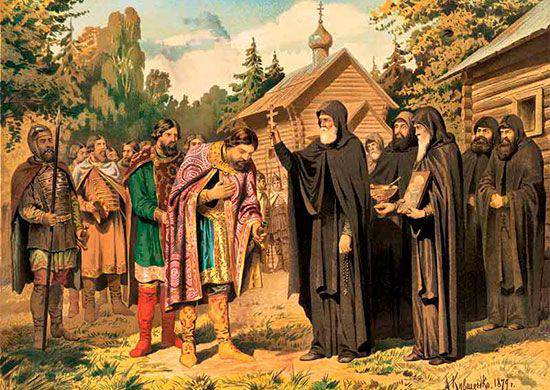
The battle plan was bold and well calculated. Dmitry decided to defeat the army of Mamai even before the Lithuanians were connected with him, and therefore advanced his regiments far to the south. The troops crossed the Don River, thereby cutting off all the ways to retreat and found themselves in an open field to fight the Horde.
The bloody battle on the Kulikovo field took place 8 September 1380 of the year. Russian regiments lined up in the pyatipolchny number. A guard regiment was set in front, whose task was not to allow the Horde horse archers to fill up the main Russian forces with a shower of arrows. Then stood the advanced regiment, which was to take on the first blow of the main forces of Mamai. Behind the advanced lined large foot regiment. On the flanks of the steel shelves right and left hands. In case the enemy breaks through the Russian system somewhere, a reserve detachment was left in the rear. In a dense oak forest on the left wing a strong ambush regiment sheltered. The ambush was commanded by Prince Vladimir Serpukhovskoy and voivode Dmitry Bobrok-Volynsky. This regiment had to enter the Kulikovo field at the most crucial moment. It is known that the Horde cavalry did not find the Russian ambush regiment.
Before the battle, Dmitry Moskovsky traveled all the shelves built on the field and addressed them with a traditional appeal to stand up for the Russian land. He was well aware that the enemy would first of all try to decapitate the Russian army, so he changed the headgear of the Moscow monarch with the boyar Mikhail Brenk and, in simple military armor, stood in the front ranks of the advanced regiment. The battle began around 12 hours of the day with a duel between Russian warrior-monk Alexander Peresvet and the Horde bogatyr Chelubey. Two knights agreed on spears, both died, but Peresvet, unlike Chelubey, remained in the saddle. The enemy perceived it as a bad omen of the outcome of the battle. After the bogatyr's duel, the Horde horsemen went on the attack. They crushed the Russian sentry regiment, which was forced to retreat to the advanced regiment, but he could not stand the onslaught of the enemy. A large foot regiment entered the battle, and then the left arm, which was soon broken by the Horde. The enemy was stopped by the Russian reserve, which immediately joined the battle. An ambush regiment hit the rear and the flank of the Horde cavalry that had broken through to the Don. This strike allowed the Russian princes and the governors to rebuild the regiments to continue the battle. Mamaev army was utterly defeated and put to flight. Russian cavalry pursued the enemy from the Kulikov Field to the tributary of the Don, the River of Beautiful Swords. The chase continued until dark. The victory went to Russian dearly. The losses were enormous; many Russian princes and boyars turned out to be among the dead. Dmitri himself after the battle was hardly found - the prince was unconscious among the dead and wounded.
The Lithuanian army, taking a wait-and-see position in 40 km from the battlefield, having learned its results, hastened to return to its possession.
For a great victory, the people nicknamed Prince Dmitry Ivanovich - Donskoy, and his cousin Prince Vladimir Serpukhov - Brave. The victory over the army of Mamaia was not just a military success, it became a harbinger of the future liberation of Russia from the Horde dependence. Returning to Moscow, the prince went to St. Sergius. Numerous memorial services were served in the monastery for the fallen soldiers, a special day of their annual commemoration, called Dimitrie's Sabbath, was instituted.
In its scale, the Kulikov Battle is one of the largest battles of the Middle Ages and occupies a prominent place in the history of military art. Dmitry Donskoy's strategy and tactics were distinguished by their offensive character, activity and purposefulness of actions. Deep, well-organized intelligence allowed us to make the right decisions and make an exemplary march to the Don. Dmitry Donskoy was able to properly assess and use the conditions of the area. He took into account the tactics of the enemy, revealed his intent. Proceeding from the terrain conditions and the tactics employed by Mamai, Dmitri Ivanovich rationally arranged the forces at his disposal, created a general and private reserve, thought out the interaction of the regiments. The tactics of the Russian army was further developed. The outbreak of the battle with the guard regiment stunned the enemy, did not allow him to use his favorite tactic of harnessing. The presence of a reserve (ambush regiment) and its skillful use predetermined the outcome of the battle in favor of the Russians.
In accordance with the Federal Law 1995 of the Year “On the Days of Military Glory and Memorable Dates of Russia”, the victory day of the Russian army in the Battle of Kulikovo is declared the Day of Military Glory.
After the victory on the Kulikovo Field, Moscow did not pay tribute to the conquerors until the new Horde Khan, Tokhtamysh, using the support of the Ryazan Prince Oleg, who indicated the detours to Moscow, did not take the city in 1382 year. Dmitry was informed about the attack of Tokhtamysh, but after the Kulikovo battle Moscow was unable to deploy a large army. The whole city burned down, except for the stone Kremlin. Taking advantage of the weakening of Moscow, Prince of Tver Mikhail, “forgetting” the oath, went to the Horde for a label on the great reign. But Dmitry Donskoy outstripped him with a "penitent embassy" to the khan. In the Horde, he hostage his eldest son Vasily, vowing to pay tribute regularly. The label for the great reign was left for Moscow, after which Dmitry went to war in Ryazan and ruined it. In 1385, Dmitry Donskoy and Oleg Ryazansky made peace.
In the spring of 1389, he became seriously ill and, feeling an imminent demise, made a testament in which he indicated that he transferred the great reign to his eldest son Vasily, without the sanction of the Golden Horde, as "his fatherland." Dmitry Donskoy died on May 19 of the year 1389, in 39 years, of which 29 is “in Moscow”. He was buried in Moscow in the Archangel Cathedral of the Kremlin.
The name of Dmitry Donskoy became a symbol of Russian military glory and valor. The time of his reign, many modern scholars believe turning in Russian history. Moscow has established itself as the center of the Russian Northeastern lands, the dependence of Russia on the Golden Horde after the Kulikovo battle began to weaken steadily.
The thirty-year rule of Dmitry Donskoy made a significant contribution to the development of the Russian army. Established its division into shelves. They were exhibited from the principalities and the largest cities, had their own banner and were headed by a prince or commander. In the second half of the 14th century, firearms appeared in Russia. In 1382, volleys of cannons, installed by Dmitry Donskoy on the walls of the Moscow Kremlin, heralded a new era in the development of Russian military art.
Since the end of the XVIII century, the name of the commander was traditionally assigned to the ships of the Russian fleet. The last of them, an armored cruiser, who died in the Tsushima naval battle of 1905 during the Russo-Japanese War. In the Navy of the Russian Federation, this tradition was renewed, since 2002 the name of Dmitry Donskoy has been a heavy nuclear submarine strategic cruiser.
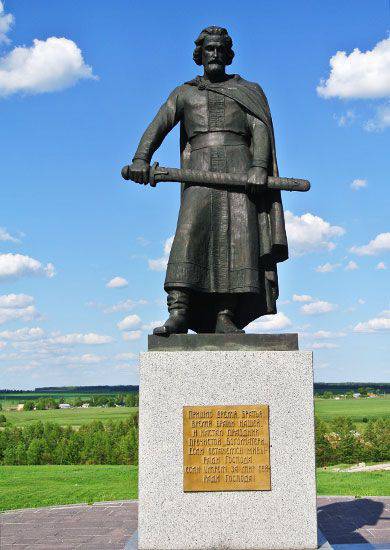
Dmitry Donskoy, as one of his favorite national heroes, has always been revered by the Russian Orthodox Church (ROC). During the Great Patriotic War, his name bore tank a convoy created on the initiative of the Moscow Patriarchate in 1944 on donations from believers and transferred to the Red Army. In 1988, the Russian Orthodox Church ranked Dmitry Donskoy as a saint. In 2004, the Russian Orthodox Church established the Order of the Holy Right Grand Duke Dimitry of Donskoy of three degrees. He is awarded priests, military leaders, veterans of the Great Patriotic War and other persons who have shown courage in defending the Fatherland, who have contributed to the development of interaction between the Russian Orthodox Church and the Russian Army, and provide spiritual and moral support to military personnel.
The memory of Dmitry Donskoy and the Kulikov battle is perpetuated in many literary works. The exploits of the Russian warriors as early as the end of the XIV – XV centuries were reflected in the “Word of the Grand Duke Dmitry Ivanovich and his brother, Prince Vladimir Andreyevich, which survived until today, as the adversary of his king Mamai” (“Zadonshchina”) and in “The Legend of Mamayev massacre.
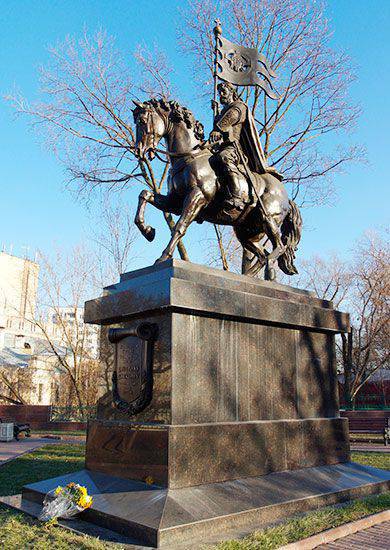
The streets of many cities of Russia bear the name of Dmitry Donskoy, in the south of Moscow one of the boulevards is named after him. In 2013, a monument to Dmitry Donskoy by sculptor V.M. Klykova. It is installed at the intersection of Nikolo-Yamskaya and Yauzsskaya streets, in the place where the Russian army assembled and sent to battle with the Horde in 1380.
Information